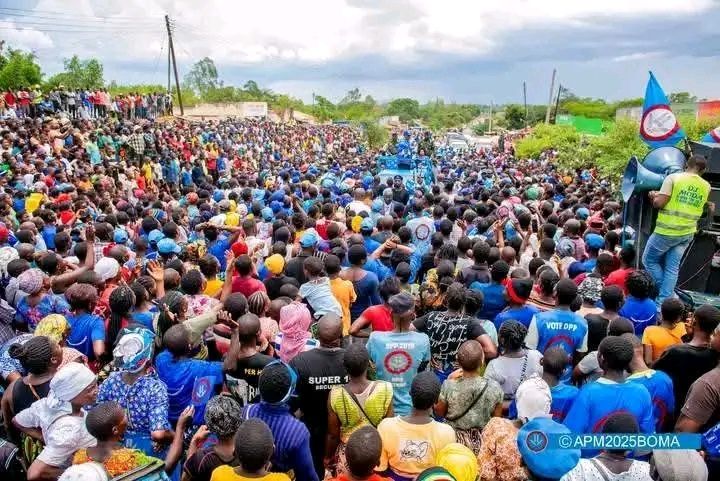By Twink Jones Gadama
In a striking display of political fervor, former President Arthur Peter Mutharika, now the leader of the Democratic Progressive Party (DPP), embarked on a whistle-stop tour through the picturesque landscapes of Mulanje, captivating thousands of supporters along the way. The atmosphere was electric, with crowds swelling into the millions, as Mutharika delivered impassioned speeches that resonated with the frustrations of many Malawians. His message was clear: the DPP is poised for a comeback, and the Malawi Congress Party (MCP) must prepare to vacate the political stage.
Mutharika’s tour, which extended to the neighboring district of Phalombe, was not merely a campaign for the DPP but a strategic maneuver to reclaim the political narrative in a country grappling with economic challenges. The former president’s rhetoric was laced with promises to reduce the cost of living, a pressing concern for many citizens who have felt the pinch of rising prices under the current administration led by President Lazarus Chakwera. Mutharika’s assertion that he possesses the know-how to lower commodity prices struck a chord with the masses, who are increasingly disillusioned with the economic policies of the current government.

As Mutharika traversed the roads of Mulanje, he was met with enthusiastic cheers and chants, a stark contrast to the political landscape that has evolved since he left office. The DPP, once a dominant force in Malawian politics, has faced significant challenges in the wake of its electoral defeat in 2020. However, Mutharika’s ability to draw such large crowds suggests that there remains a substantial base of support for the party, particularly in regions where the DPP has historically been strong.
The former president’s message was not just about economic recovery; it was also a rallying cry against the MCP, which he accused of failing to deliver on its promises. Mutharika’s call for the MCP to “pack and go” was a direct challenge to the ruling party, signaling that the DPP is ready to reclaim its position as a key player in Malawian politics. This confrontational stance is indicative of a broader strategy to galvanize support by positioning the DPP as the viable alternative to the current government.
However, while Mutharika’s promises of economic relief may resonate with many, the question remains: can he deliver on these commitments? The Malawian economy has faced numerous challenges, including inflation, currency depreciation, and supply chain disruptions, exacerbated by global economic conditions. Mutharika’s confidence in his ability to reduce commodity prices may be seen as optimistic, especially given the complexities of the current economic landscape. Critics may argue that such promises are more about political posturing than feasible solutions.
Moreover, Mutharika’s return to the political forefront raises questions about the DPP’s internal dynamics and its ability to present a united front. The party has experienced significant fragmentation since its electoral defeat, with various factions vying for influence. Mutharika’s leadership will be tested not only by the need to appeal to a broad electorate but also by the necessity of managing internal dissent and ensuring party cohesion.
The political landscape in Malawi is further complicated by the growing discontent among the populace regarding governance and accountability. Mutharika’s tour comes at a time when many citizens are demanding transparency and effective leadership. The DPP’s past governance record, marred by allegations of corruption and mismanagement, will undoubtedly be scrutinized as Mutharika seeks to re-establish the party’s credibility. The challenge for the DPP will be to convince voters that it has learned from its past mistakes and is prepared to offer a new vision for the future.
As Mutharika continues his campaign, the response from the MCP and other political actors will be crucial. The ruling party will likely intensify its efforts to counter Mutharika’s narrative, emphasizing its achievements and the challenges it has faced since taking office. The political discourse in the coming months will be shaped by the interplay between these competing narratives, as both parties vie for the hearts and minds of the electorate.
Arthur Peter Mutharika’s whistle-stop tour in Mulanje represents a significant moment in Malawian politics, signaling the DPP’s intent to reclaim its position as a formidable force. While the former president’s promises of economic relief resonate with many, the path to political resurgence is fraught with challenges. The DPP must navigate its internal dynamics, address the legacy of its past governance, and present a compelling vision for the future. As the political landscape evolves, the question remains: will Mutharika’s return herald a new chapter for the DPP, or will it be a fleeting moment in the ever-changing tapestry of Malawian politics? The coming months will undoubtedly reveal the answers as the nation prepares for what promises to be a contentious electoral battle.



